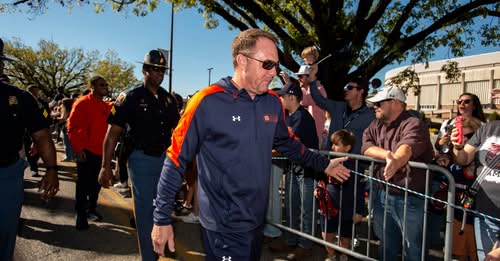Hugh Freeze, the head football coach at Auburn University, has made a bold and confident prediction that Auburn will be “in the College Football Playoff (CFP) conversation” in 2025. This statement reflects both his optimism and determination to restore Auburn’s football program to national prominence. Freeze’s declaration is not just an empty boast; it is a promise grounded in his vision for the program, his coaching philosophy, and the potential he sees in his current roster and recruiting efforts. It also signals a larger ambition for Auburn to reclaim its status as a powerhouse in college football, competing alongside traditional SEC heavyweights and national contenders.
To understand the weight of Freeze’s prediction, it is important to consider the context of Auburn’s recent history. Auburn has long been a respected football program with a rich tradition, boasting national championships and producing numerous NFL players. However, in recent years, the program has struggled with consistency, often falling short of competing at the very highest levels. The SEC, known as one of the most competitive conferences in college football, demands excellence every season, and Auburn has found itself caught in the middle tier, failing to break through to the elite level consistently. Freeze’s arrival at Auburn brought fresh energy and a new strategic direction. His previous success at Ole Miss, where he led a competitive program, gave Auburn fans hope that he could rejuvenate their team.
The path to being “in the CFP conversation” means that Auburn must position itself among the top teams in the nation, capable of winning enough games against quality opponents to be considered for the four-team playoff. It is no small task, especially in the SEC West, where programs like Alabama, LSU, and Texas A\&M regularly dominate. Freeze’s statement signals his belief that Auburn has the talent, the coaching staff, and the institutional support to compete at this level. It also reflects a longer-term plan that goes beyond just a single season but aims for sustained success.
One key factor in Freeze’s confidence is recruiting. Auburn’s ability to attract top talent from across the country will be crucial to building a team capable of competing for championships. Freeze has emphasized building relationships with recruits and their families, selling the Auburn vision, and creating an environment where players can develop both on and off the field. Recruiting in the SEC is notoriously competitive, but Freeze’s track record and charisma give him an edge in convincing elite prospects that Auburn is the right place to play. If Auburn can consistently bring in top recruiting classes, it will provide the depth and skill needed to challenge the conference’s best teams.
Freeze’s coaching philosophy also plays a vital role in his prediction. Known for his offensive creativity and adaptability, Freeze has shown a willingness to tailor his approach to the strengths of his players. This flexibility is essential in today’s college football landscape, where offenses evolve rapidly and teams must be prepared to counter a variety of styles. Auburn’s offense under Freeze is expected to be dynamic and high-scoring, capable of putting pressure on opponents. At the same time, Freeze understands the importance of building a balanced team, emphasizing strong defense and special teams to complement the offensive firepower.
Another element that contributes to Freeze’s bold forecast is the culture he aims to instill within the program. Success in college football is often as much about mindset and culture as it is about talent and tactics. Freeze is known for his emphasis on discipline, accountability, and teamwork. He wants Auburn players to buy into a culture of winning and to hold themselves to high standards both on and off the field. This cultural shift is crucial for building a program that not only wins games but also maintains consistency and resilience through adversity. Freeze’s prediction of being “in the CFP conversation” reflects his confidence that this cultural transformation will take root and elevate Auburn’s performance.
The support from the Auburn administration and fanbase is another important piece of the puzzle. College football programs that aim for national success need more than just a good coach and talented players—they need institutional commitment and resources. Auburn has a passionate fanbase and a history of investing in its football program. The athletic department’s backing of Freeze’s vision and willingness to provide the necessary facilities, staffing, and financial support will be key to turning his prediction into reality. Freeze’s ability to inspire confidence among the administration and boosters ensures that Auburn’s football program remains a top priority, which will help maintain momentum and stability.
It is worth noting that Freeze’s prediction also carries a psychological impact. By publicly setting high expectations, Freeze sends a message to his team, recruits, opponents, and the media that Auburn is serious about competing at the highest level. This can motivate players to rise to the challenge and attract recruits who want to be part of a winning program with championship aspirations. It also signals to opponents that Auburn is not a team to be overlooked, which can change the dynamic of games and seasons. Setting such a goal can foster a mindset of confidence and resilience that is necessary for overcoming the inevitable challenges in a tough college football schedule.
Of course, the path to being “in the CFP conversation” is not without obstacles. Auburn will face stiff competition from some of the best programs in the nation. Injuries, player development, game-day execution, and even luck play roles in determining a team’s success. However, Freeze’s confidence suggests that he believes his team can overcome these challenges through preparation, focus, and a strong team identity. His past experience in rebuilding and competing in the SEC equips him with the insight to navigate the complexities of the college football landscape.
The impact of Freeze’s prediction extends beyond just the 2025 season. It sets a benchmark for the program and lays the groundwork for what Auburn aims to achieve in the coming years. Whether Auburn reaches the CFP in 2025 or not, the commitment to competing at that level will shape recruiting strategies, training regimens, game planning, and overall program management. Freeze’s bold statement creates a vision that can unify players, coaches, and supporters around a shared goal, driving continuous improvement.
In addition, Freeze’s prediction reflects a broader trend in college football where programs outside the perennial favorites are striving to break through. The CFP system, with only four spots available, is fiercely competitive, but it also rewards teams that can maintain excellence over the course of a season and prove themselves in high-profile matchups. Auburn’s positioning in this landscape requires not only talent and coaching but also strategic scheduling and consistent performance. Freeze’s confidence implies that Auburn will be proactive in arranging a schedule that allows them to demonstrate their capabilities and earn a spot in the national conversation.
In summary, Hugh Freeze’s bold prediction that Auburn will be “in the CFP conversation” in 2025 is a testament to his belief in the potential of the program under his leadership. It reflects his confidence in recruiting, coaching, culture-building, and institutional support. While the road ahead is challenging, Freeze’s vision provides a clear and ambitious target for Auburn football. If realized, it would mark a significant resurgence for a program with a proud history and passionate fanbase, reestablishing Auburn as a national contender and a formidable force in college football. Whether Auburn achieves this goal will depend on many factors, but Freeze’s prediction has certainly set the stage for an exciting future.



